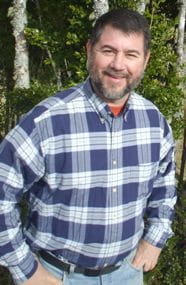A BS in Communication faculty member explains why he established the Tenio Natural Reserve in Chile.

Children near Chile’s Valdivian rain forest have no local high school to transfer to once they finish eighth grade. Gordon McLean, a BS in Communication faculty member who splits his time between the United States and Chile, wants to change that. He runs the not-for-profit Tenio Natural Reserve, where student volunteers study environmental conservation and preservation of the ecosystems of southern Chile.
HOW DID YOU END UP IN CHILE?
In 1989, I worked as an intern in the communication department at the U.S. Embassy and studied journalism at Pontificia Universidad Católica de Chile in Santiago. In 1997, my wife, Lisa, and I adopted two six-month-old children in Concepción. We decided then that we wanted to raise them with both languages and cultures and a sense of ecology.
WHAT’S THE IDEA BEHIND THE TENIO NATURAL RESERVE?
We created the Tenio Natural Reserve on the western edge of the Valdivian rain forest between Puerto Montt and Chiloe Island in 2006. It hosts volunteers from around the world every year. “Putenio” means “between the tenio trees,” and while they were once common here, they are now quite rare. We have an active tenio seedling project and a growing list of adult trees on the 210-acre property. We’re also actively involved in our local community, including the education system. We are opening a high school in 2012—it will be the first on the peninsula.
HOW DO YOU BRING THE TENIO EXPERIENCE TO YOUR WALDEN STUDENTS?
At the reserve there are daily leadership and communication challenges and opportunities—across languages, cultures, traditions, and even legal and economic systems—that allow me to bring additional insight to the classroom. In our increasingly interconnected global marketplace, I hope to prepare my students for their first international job assignments by arming them with real-world insight on tasks like managing employees in a different language and approaching leadership as community mobilization.
HOW DOES AN UNDERSTANDING OF COMMUNICATION AND LEADERSHIP ENHANCE OPPORTUNITIES FOR SOCIAL CHANGE?
I’ve learned communication skills can make all the difference in reaching and exceeding your goals. I’ve also learned that actions speak louder than words, and that my children learn from everything we do. Learning to communicate across languages and cultures is important; so is being part of a community or a team, and demonstrating initiative and persistence.
HOW CAN WALDEN STUDENTS BEST PURSUE THE GOAL OF SOCIAL CHANGE?
It’s important to start by taking small steps. It could be just one hour of volunteer effort, but then it could grow into two and three and become a habit that changes your life. It all starts with the decision to make a difference.



